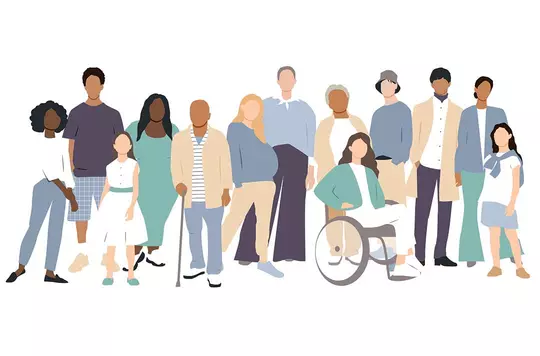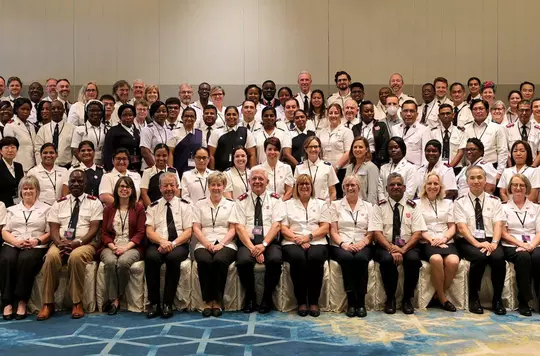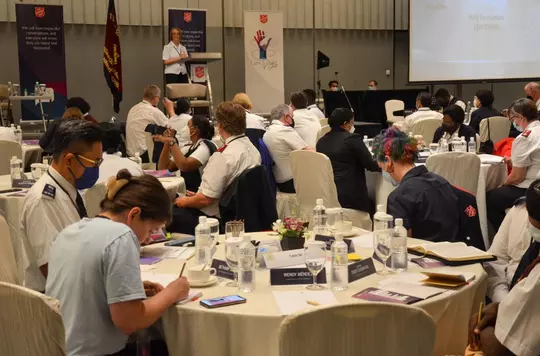30 January 2023
The blame game: 'We find judgement being passed everywhere'
Major Vikki Burr
Major Vikki Burr considers the value of the ‘golden rule’.
Key text
Open the newspaper, turn on the TV to watch the news, switch on the radio and very soon you will read, see or hear someone blaming someone else for the state of their life. We find judgement being passed on behaviour, choice of language, and even whether a T-shirt carries the correct logo with the correct words in the correct colour. There will always be somebody stating an opinion about, offering a comment on or judging another person.
Do we join in the second we open the newspaper, turn on the news or switch on the radio? Whether we speak it out or not, isn’t it true that we, too, have an opinion, a comment to make or a judgement to pass?
Pause and reflect
- What is the kindest thing someone has ever done for you?
Have you ever heard of the ‘golden rule’? It is this: ‘Do to others what you want them to do to you.’ Many faiths and belief systems have a version of it.
In our study passage, Jesus unpacks this principle and ensures his listeners get the point. You don’t like being judged? Then, don’t judge others. Want to be forgiven? Then, forgive. The more you do this, the more you receive.
Many of us will have knocked over a pot on a desk while wanting to squeeze just one more pencil or paperclip in. This is what verse 38 is encouraging us to do – to use all our resources and energy to squeeze it all out for the sake of another. This creates a wonderful to-ing and fro-ing of kindness and understanding – a reciprocal process, flowing back and forth.
Pause and reflect
- Can you recall a time when you gave something – whether in time, energy, money or emotion – and felt you received more, or something unexpected, in return?
The golden rule isn’t just about how we interact as individuals but also about what type of society we want to live in. Jesus says that a student is not above their teacher. In other words, a student needs to look to, listen to and learn from their teacher. Equally, the teacher needs to remember that the student will, in the end, become like them. If the teacher is stern, domineering or opinionated, so, in time, the student will be likewise. Parents will know the experience of telling off their child for unacceptable behaviour only to realise that they learnt it from watching them.
Each one of us is surrounded by people who look to us, notice us and are influenced by us. Their behaviours and attitudes can be, and are being, influenced by their interactions with us. We all know that smiling – as well as yawning – is contagious. In the same way, we need to be aware of who we are following and to whom we are looking to for guidance and advice. How are those around us influencing us? Which teacher are we emulating?
Pause and reflect
- Who do you interact with on a daily or weekly basis? Consider what influence you have with them.
- How do you behave and interact with them?
- Is there anything you need to change?
The fact that the golden rule is an almost universal maxim shows that, as humans, we are all trying to figure out how best to get along with each other. However, Jesus doesn’t leave us floundering. He not only models the answer through his life but also gives us direction through his teaching.
He tells us – his hearers – to look to themselves. Are they perfect? Do they sometimes get it wrong and make mistakes? Do they always mean to? No – then what is true for them is true for everyone. Rather than berating each other – judging one another – we should offer support to each other.
True, metaphorically the blind cannot lead the blind, but we each have different blind spots. We all carry unconscious biases and prejudices. We might prefer one person to another. We might think that one form of ministry is more important than another. In reality, everyone is equal and needed.
Accepting the reality of our personal blind spots, and making allowances for them in other people, enables us to support each other, so that we develop and move forward together.
Ultimately, this is not a passage about judgement, blame or pointing out wrongdoing, but, as is so often the case with Jesus, it is about generosity, compassion and love.
Pause and reflect
- When you show kindness through your words or actions, how does that make you feel?
- How can you show love and kindness this week?
- Do you know what your blind spot might be?
- Is there someone you could discuss this with?
- Are you ready to let someone support you when you need it?
The golden rule is great, but I think the words of the prayer attributed to St Francis of Assisi – and captured in the song ‘Make Me a Channel of Your Peace’ (SASB 608) sum it up even better:
O Master, grant that I may never seek
So much to be consoled as to console,
To be understood, as to understand
To be loved, as to love with all my soul.
Bible study by

Major Vikki Burr
Head of Operations, Well-Being Department, THQ
Discover more

Lieut-Colonel Karen Shakespeare considers how harmony reveals the richness of God’s Kingdom.

Lieut-Colonel Jayne Roberts reflects on her experience of being a UKI delegate at IHQ's Symposium on Human Sexuality.

Bethany Gibson reflects on her experience of being a UKI delegate at IHQ's Symposium on Human Sexuality.

Love your enemies, do good to them, and lend to them without expecting to get anything back.
